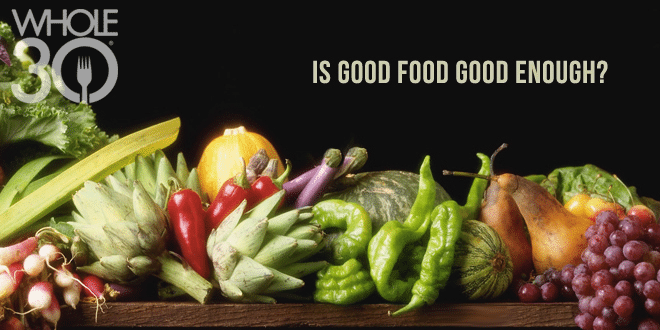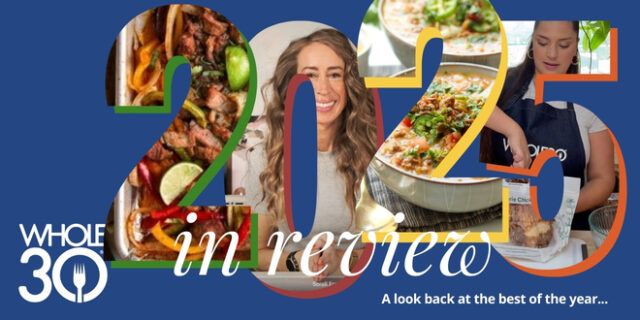In our first New York Times bestselling book, It Starts With Food, we say that the food you eat either makes you more healthy or less healthy. In our follow-up book The Whole30, we then help you figure out which foods make you healthier or less healthy in your own individual context. People experience such stunning success with our Whole30 program because it teaches you it’s just that simple: eat the foods that make you more healthy, in a way that feels balanced and sustainable for you. But sometimes, simple ideas can get mired down in the muck of the media (traditional and social), well-meaning but misguided academic research, celebrity opinions, or salespeople trying to hock their wares. That’s why we find it completely understandable that Whole30’er Heidi M. sent us this email:
I am a Whole30 veteran and advocate. I know it works. I moderate a Whole30 support group. Heck, I’m even one of the testimonials in your first book. I eat clean and I take good care of myself. So what do I say to people who are coming at me with, “Our food is now so depleted that even if you eat whole foods, you aren’t getting the nutrition you need, which is why you NEED supplements…” and then invariably go on to try and sell me their Isagenix or whatever?
Is Good Food Good Enough?
Heidi’s question is a good one, and one we hear often. So, what’s the real deal? Is eating Good Food good enough? If you are focusing primarily on eating things that make you more healthy, are you still short-changing yourself in the nutrition department? Do we need to take a litany of vitamins and minerals just to make sure we’re getting the extra nutrients that our grandparents got from their food? While we think there may be a grain (no pun intended) of truth in the argument that the nutritional impact of our food today is not the same as that of our forefathers, we’re not telling you to run out and load up on multivitamins just yet—because obesessing about this particular detail of your diet can be a fast-track to crazytown for health-conscious folks.
The Straight Dope
Yes, there’s a lot of chatter out there about how our food nowadays has less nutritional value than that of even 50 years ago. And there are plenty of articles (like this one and this one) and studies (like this one) that tell you that today’s asparagus has 11% less iron, and watermelon in 1953 had 42% more vitamin A. But what does that mean, and how important is it to our overall health? The argument about today’s potentially less nutritious whole foods stems from the idea that over the past several decades, food production has changed quite a bit (understatement), and that we haven’t been particularly kind to our environment (massive understatement). The soil that grows our fruits and vegetables has been depleted of nutrients due to our modern-day farming practices (like pesticides and fertilizers) and industrialization. It doesn’t help that we’ve been breeding certain crops for greater yield, pest resistance, taste, and climate adaptability—a practice that comes at the expense of nutrient-density. And when it comes to meat, seafood, and eggs, factory farming is the issue—if our animals aren’t raised in a natural, healthy environment and fed natural, nutrient-dense, appropriate food, then their meat isn’t going to be as nutritious.
Go Organic?
Is “going organic” enough to make up for what we’ve lost? Scientific evidence is conflicting when it comes to measuring the percentage of vitamins, minerals, antioxidants, and other micronutrients in fruits and vegetables. This 2014 British Journal of Nutrition meta-study (a review of 343 studies) seems to find a connection between going organic and antioxidants, while a 2012 Stanford meta-study evaluated forty years of research that compared organic to conventional food and found that neither had an advantage over the other when it came to nutrients. (Of course there are other things like pesticides to consider when deciding organic versus conventional, and the Stanford study has it’s critics.) Meat, however, is a different story, which is part of the reason why we say that if you can, put your food dollars toward high-quality meats, seafood, and eggs first and foremost (the rest of the reason can be found in our Conscientious Omnivore series). There is pretty definitive evidence that grass-fed meat is much more nutrient dense (with a better fatty acid profile and more vitamins and antioxidants) than it’s factory-farmed counterpart.
Good Food For the Win
In the end, we’ll encourage Heidi (and the rest of you) not to get caught up in food reductionism. That apple you just took a bite of shouldn’t be viewed as a carrier for 10% of your niacin intake for the day, and there’s a reason that steak you had for lunch didn’t have a label: because it’s Food, not Stuff You Can Eat. And if you focus on eating Good Food, you’re already light years ahead in the nutrient-density game. Plus, remember that the way whole foods work in our diet is more than just the sum of its parts. Oranges aren’t just vitamin C, they’re a huge array of complimentary vitamins, minerals, and phytonutrients that work together synergistically to keep you healthy in ways that most studies say a vitamin C supplement just can’t—and there can be health drawbacks to superdosing with any one micronutrient alone. In summary, taking 72 pills a day to make up for what your food may be missing is going too far, and is wholly unnecessary. So what should you do? Improve the quality of your food, doing the best you can with things like pastured/wild-caught/100% grass-fed, organic meat and local, seasonal, organic produce. Eat a wide variety of these healthy, micronutrient-dense foods. Outside of food, work to create a healthy lifestyle, focusing on stress-reduction, outdoor exposure, socialization, and healthy movement. If you’re doing that, we think you’re in pretty darn good shape. However, it may still be a good idea to supplement with the basics; the proven stuff that you know you may not be getting enough, because of a stressful lifestyle, less than perfect food quality while traveling, or just because it makes sense to you. Based on our experience and the scientific literature, we believe many people would benefit from taking high-quality fish oil, vitamin D3, magnesium, and maybe some digestive help, like enzymes or probiotics. These are cost-effective (not pushing real food off your plate), have well documented benefits in the literature, and come with generally very few down sides, if administered reasonably. See page 74 in The Whole30 for more details, and the Appendix for information about which brands we recommend.
















